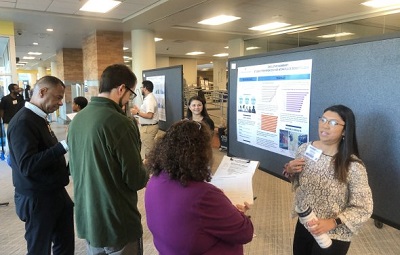Applying an Integrative Heritable Component Approach to the Identification of Highly Heritable Traits in Diseases with Complex Etiology
Description/Abstract/Artist Statement
Despite numerous recent genome-wide association studies on alcohol use, progress in identifying genetic associations for Alcohol Use Disorder (AUD) has been limited due to the extensive heterogeneity associated with this disorder in terms of clinical manifestations, underlying genetics, and environmental factors. To address this challenge, we propose the use of a novel statistical approach which integrates phenotypic, genotypic, and environmental data to derive disease related traits with maximized heritability. The method will be applied in two phases. In phase 1, a statistical method will be developed that aims to identify a function that leads to the identification of a trait with a maximized heritability estimate. This method will make use of a linear-mixed-model which will account for the moderating effects of environmental factors. We will further investigate the application of a constraint to the derived traits which will allow them to be interpreted as severity indexes for alcohol use disorder. In phase 2, genome-wide association studies will be conducted to identify genetic risk factors associated with the derived traits.
Faculty Advisor/Mentor
Jiangwen Sun
Faculty Advisor/Mentor Department
Computer Science
College Affiliation
College of Sciences
Presentation Type
Poster
Disciplines
Computer Sciences
Session Title
Poster Session
Location
Learning Commons Lobby @ Perry Library
Start Date
3-25-2023 8:30 AM
End Date
3-25-2023 10:00 AM
Upload File
wf_yes
Applying an Integrative Heritable Component Approach to the Identification of Highly Heritable Traits in Diseases with Complex Etiology
Learning Commons Lobby @ Perry Library
Despite numerous recent genome-wide association studies on alcohol use, progress in identifying genetic associations for Alcohol Use Disorder (AUD) has been limited due to the extensive heterogeneity associated with this disorder in terms of clinical manifestations, underlying genetics, and environmental factors. To address this challenge, we propose the use of a novel statistical approach which integrates phenotypic, genotypic, and environmental data to derive disease related traits with maximized heritability. The method will be applied in two phases. In phase 1, a statistical method will be developed that aims to identify a function that leads to the identification of a trait with a maximized heritability estimate. This method will make use of a linear-mixed-model which will account for the moderating effects of environmental factors. We will further investigate the application of a constraint to the derived traits which will allow them to be interpreted as severity indexes for alcohol use disorder. In phase 2, genome-wide association studies will be conducted to identify genetic risk factors associated with the derived traits.


